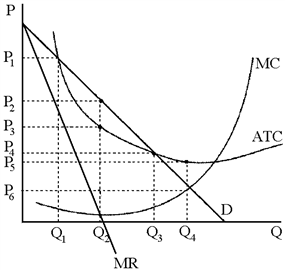Which of the following costs are part of a firm's opportunity costs? I. costs for resources bought in markets II. costs for resources the firm owns III. costs for resources supplied by the owner
A) I and II
B) I and III
C) I only
D) I, II, and III
D
You might also like to view...
Explain why an airline may decide to sell an air ticket to a stand-by passenger at less than the full fare if there are empty seats on the airplane?
What will be an ideal response?
If the government levies a $1,000 tax per boat on sellers of boats, then the price paid by buyers of boats would
a. increase by more than $1,000. b. increase by exactly $1,000. c. increase by less than $1,000. d. decrease by an indeterminate amount.
Figure 11-6

The profit-maximizing monopolist in Figure 11-6 will sell its output at
a.
P1.
b.
P2.
c.
P3.
d.
P4.
All other factors held constant, an investment:
A. with less risk should sell for a lower price and offer a lower return. B. with more risk should offer a lower return and sell for a higher price. C. with less risk should sell for a lower price and offer a higher expected return. D. with more risk should sell for a lower price and offer a higher expected return.